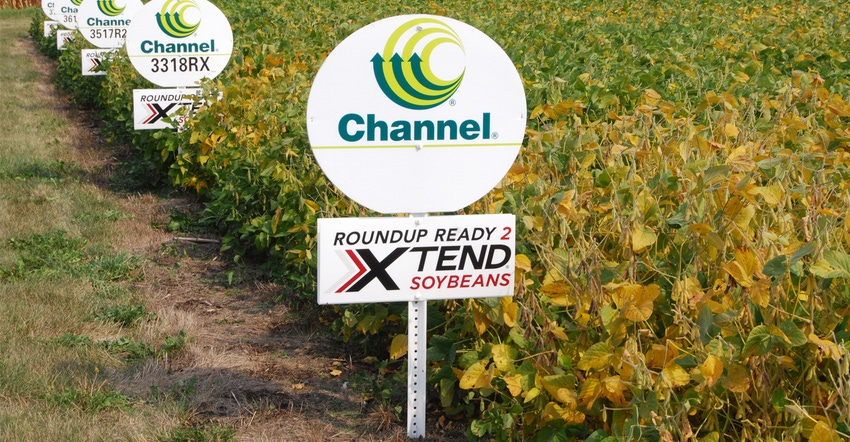January 22, 2019

The Iowa Department of Agriculture and Land Stewardship in mid-January issued a Special Local Needs registration for the dicamba herbicide products, which are used extensively on soybeans.
They are XtendiMax with VaporGrip Technology, FeXapan plus VaporGrip Technology, and Engenia herbicide. The registration outlines topics that must be covered during the auxin-specific (dicamba) training, which is required as part of the EPA product registration.
The training sessions in Iowa start Jan. 22, with meetings at Estherville, Huxley and Webster City. Meetings are set for Jan. 23 at Belle Plaine, Jan. 24 at Mount Pleasant, Jan. 28 at Altoona, Jan. 29 at Chariton and Rock Rapids, and Jan. 30 at Ottumwa. February has a full calendar with training meetings to be held somewhere in Iowa almost every weekday during the month.
Training and certification required
In 2019, EPA requires annual training for all applicators of dicamba herbicides, just as it did in 2018, and the dicamba products remain on EPA’s restricted-use list. What’s different this year is that these products can now be bought and applied only by certified applicators. Before, someone without certification could apply the product if he or she worked under the supervision of someone with certification.
In addition to the federal label requirements, each state can add additional requirements as to what it takes to buy and apply dicamba on soybeans in that state.
“We worked closely with Iowa State University to develop the updated training topics for these meetings in Iowa,” says Mike Naig, Iowa secretary of agriculture. This additional training requirement is specifically for farmers and applicators who will be using dicamba products during the upcoming growing season.
“This training is separate and distinct from the pesticide applicator continuing instruction courses that are already in place for applicators. It is important that all applicators closely follow all aspects of the product label when using dicamba products.”
Attend training session near you
IDALS is working with the Agribusiness Association of Iowa to provide a list of approved training sessions at various locations in Iowa. For a schedule of the sessions located across the state in January and February, visit dicambatrainingiowa.org.
The following topics will be included in all approved 2019 auxin-specific (dicamba) training sessions in Iowa:
use of buffers to reduce pesticide exposure to nontarget species
websites listed on the pesticide label including nozzles, tank-mix partners, EPA Bulletins Live and sensitive crop registry
weather conditions and timing of application to include wind speed, temperature, humidity and time of day
sprayer system cleanout procedures and approved tank mixes
record-keeping requirements to include crop planting date, buffer requirement, sensitive crop awareness, product label and time of day
The IDALS Pesticide Bureau is responsible for responding to complaints and investigating potential misuse of pesticides. In addition, education and testing on the safe use of pesticides is administered to all licensed pesticide applicators by IDALS in conjunction with ISU Extension.
“It’s important that all applicators read and follow the label directions on any pesticide when using,” says Gretchen Paluch, pesticide bureau chief at IDALS.
Product labels give applicators information about safe handling, application rates, personal protective equipment, appropriate crops to be treated, tank mixes, avoiding drift and more. It is a violation of state and federal law to use a pesticide in a manner inconsistent with label directions.
Check FieldWatch before spraying
IDALS this year will continue to maintain FieldWatch, the free online registry for apiaries and commercially grown crops sensitive to pesticides. Applicators are encouraged to check FieldWatch before applying pesticides. Iowans with qualifying crops or beehives should register their locations at fieldwatch.com.
If there is concern about a specific pesticide misuse incident, Iowans can file an incident report with the IDALS Pesticide Bureau at 515‐281‐8591 or by emailing the information to [email protected]. This report must be filed within 60 days after the alleged date that damages occurred. More information about activities of the Department’s Pesticide Bureau is at iowaagriculture.gov.
About the Author(s)
You May Also Like






